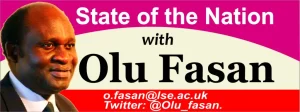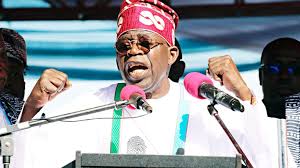
By Olu Fasan
FOR those who have not yet noticed it, here’s a major difference between Bola Tinubu and Muhammadu Buhari, his immediate predecessor as president. While Buhari was tongue-tied and taciturn, Tinubu is free-tongued and expressive. While Buhari kept most of his limited thoughts to himself, Tinubu has something to say on virtually every subject, except his personal life, and is more than willing to say it. Indeed, he’s been speaking!

That, clearly, is a positive thing. For, as Professors Paul Collier and Tim Besley put it in their seminal report Escaping the fragility trap, “Leaders are first-and-foremost communicators.” They argued that “narratives” are a powerful tool that leaders can use to transform their nation: narratives about their vision for a better future, narratives about what must be done to achieve that future and narratives about how they intend to lead their country towards that better future. So, it’s a good thing that Tinubu is talking to Nigerians.
But here’s the rub. Firstly, a leader’s narrative can only carry weight and have salience if, for a start, he gained trust. If there is a perceived gap between what a leader says and what he really means or represents, his narrative would fail. Secondly, narratives are not credible unless they are followed by credible signaling actions.
A leader whose narratives are not backed with the right actions would lose credibility. Finally, narratives must be realistic and promise what can be visibly delivered. After all, it’s delivery and tangible results that matter. Thus, trust, credible actions and tangible results will define how Tinubu’s administration is judged over the next four years, assuming the Supreme Court affirms his presidency. But if the first 100 days are anything to go by, and are a guide to the future, there’s little room for hope.
Truth is, Tinubu has not gained the trust of most Nigerians, and even the residual trust, based on his over-hyped performance as governor of Lagos State, has been dissipated. There have been activities but no credible actions, and, let’s face it, the living standards of most Nigerians have deteriorated since he assumed office. So, no positive results!
Yet, Tinubu’s speeches are often hailed by Nigerians. Some applauded his inaugural speech, some cheered his national broadcasts, some commended his speech at the United Nations General Assembly. Surely, some will praise his Independence Day speech this week. But political speeches are defined by rhetorical flourishes and inherent vacuity, insincerity and sophistry.
Thus, one must take them with a pinch of salt, not at face value. In his famous essay Politics and the English Language, George Orwell said that “political language is designed to make lies sound truthful and murder respectable, and to give an appearance of solidity to pure wind.” Well, the positive spin that Tinubu’s aides put on his 100 days in office when, in fact, it has been ”blood, sweat and tears” comes close to what Orwell was describing. That the administration resorts to misrepresentations, half-truths and outright lies, in a bid to claw at some positive news, again proves Orwell right.
Think about it. At every meeting of world leaders, it’s common for some to meet formally through bilateral meetings or informally through “brush-bys” or “pull-asides”. But Tinubu’s putative brief meetings with the US president and the Indian prime-minister were hyped as if they were a national accomplishment. And his meeting with the leader of the United Arab Emirates was said to have triggered immediate lifting of the country’s visa ban on Nigerians and resumption of Emirates Airlines flights to Nigeria. Both false “achievements” were seized upon by Tinubu’s loyalists as evidence that he’s a superstar-president, as was the false claim that he was the first African leader to ring the NASDAQ closing bell. All the propaganda was designed, as Orwell puts it, “to give an appearance of solidity to pure wind”!
But a much bigger challenge to Tinubu’s narratives is lack of trust. For instance, he urged Nigerians to shun ethnic and religious rivalries, but fuelled religious and ethnic divisions with his Muslim-Muslim ticket and Yoruba lokan/Emi lokan ethnic card. He spews rhetorical bluster about fighting corruption, but many in his cabinet face serious allegations of corruption or malfeasance.
Last week, Tinubu’s lawyer asked a US court not to release his Chicago State University academic records because “severe and irreparable harm will be done to Bola Tinubu if the records are released”. Why should Nigeria’s president be in such a situation? Isn’t it a national embarrassment that Encyclopaedia Brittanica’s entry on Nigeria’s president reads: “Many of the details of Tinubu’s early life, education, work, and finances are unclear”?
Recently, I was interviewed on News Central TV. I said Tinubu oversold himself during the election and some Nigerians bought the overselling. Well, in government, he’s still overselling himself and some are still buying the overselling. In his inaugural speech, Tinubu listed several national issues, including insecurity and the economy. Then, he concluded: “I declare that these things are within our proximate reach because my name is Bola Ahmed Tinubu, and I am the President of the Federal Republic of Nigeria.” A superstar president!
Yet, according to the International Centre for Investigative Reporting, ICIR, 629 people were killed within 45 days of Tinubu’s presidency. Since then, terrorists have killed many more, including 30 soldiers in August. His poorly-implemented removal of the fuel subsidy and flotation of the naira have pushed inflation to over 25 per cent, the highest since 2015, and exchange rate to nearly N1000 to $1, while deepening poverty. Crucially, as the Economist magazine rightly put it, “his new administration is remarkably thin on technocrats. Instead, he seems to be repaying political favours and shoring up support”. The magazine adds: “This lack of technical expertise is a shame.” I agree.
But Tinubu’s confidence in his own ability – “because my name is Bola Ahmed Tinubu” – is utterly misplaced. Nothing in his 100 days in office justifies that boastfulness. Rather, he’s been muddling through. Yet, flowery presidential speeches won’t transform Nigeria. There must be credible actions and tangible results. Sadly, so far, Tinubu is all talk!




GIPHY App Key not set. Please check settings